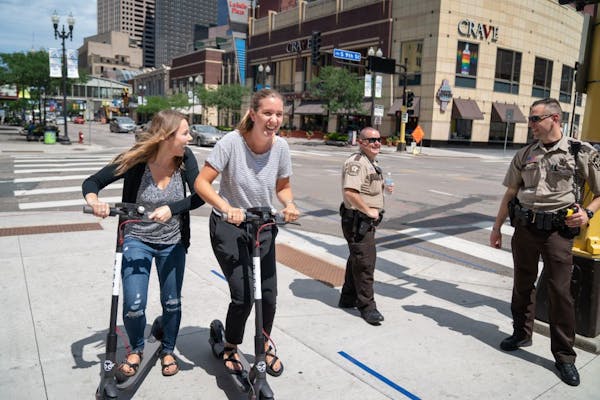A surprise fleet of two-wheeled rental scooters rolled onto the streets of Minneapolis and St. Paul Tuesday, giving local residents their first look at electric scooters popping up in cities across the country.
"In the summer why not just buzz around on these?" asked Jeff Pauline, 30, as he examined a scooter and rang the tiny bell at the intersection of 2nd Avenue and 7th Street in downtown Minneapolis. "It seems kind of fun."
Without warning, dozens of the scooters appeared the morning a Minneapolis City Council committee got its first look at a proposed ordinance that would require companies to obtain a license to operate motorized scooters in the city. Riders could be seen gliding along Nicollet Mall and through downtown Minneapolis, at speeds up to 15 mph.
The scooters are dockless, so users can ride them a few blocks, or more, and drop them wherever they want.
The city's ordinance would mostly regulate keeping parked scooters from blocking sidewalks and other public rights of way and would create a license agreement with operators. State law already determines where motorized foot scooters can operate.
Bird Rides Inc., one of the biggest operators, launched the first fleet of scooters in Minneapolis, but the Santa Monica, Calif.-based company won't say how many of what it calls "Birds" are now available in the Twin Cities.
"We do not share the number of Birds in each city for competitive reasons and, more importantly, because it is always changing based on demand," the company said in a statement. "We are committed to responsible growth, which means we only add more Birds when each is being ridden three or more times per day."
The company said it has submitted paperwork in Minneapolis and St. Paul to operate as a business.
"Nothing surprises me," Jon Wertjes, the city's director of traffic and parking services, said about the sudden appearance of the scooters in Minneapolis.
The arrival of Bird scooters was a "surprise" in St. Paul, said Lisa Hiebert, spokesperson for St. Paul's Public Works Department. "They did not go through the proper channels to get a permit."
Later in the day, Hiebert's department asked Bird to remove their scooters from the city's public right of way, essentially areas designated for travel, until the city can create a "framework" for them. The city said the company violated city ordinance that requires a permit for use of public space.
Wertjes told the Minneapolis council's Transportation & Public Works Committee that shared scooters can provide an alternative means of transport for short trips.
"With this proposed ordinance, the city intended to take a proactive approach to welcome this new mobility option, regulating the operation and the sharing of motorized foot scooters, ensuring there is proper time to better understand and evaluate shared scooter operations as the industry continues to mature," he said.
Wertjes said scooters have caused disruptions in the other cities where they were deployed, such as "improper riding and parking of scooters in areas which impeded or endangered pedestrians, as well as damage or vandalism to scooters and other public or private property."
In San Francisco, city officials in April issued a cease-and-desist order after the scooters arrived, saying they were illegal and a public nuisance. Other cities like Austin, Texas, and Washington, D.C., have scrambled to adopt regulations as more scooters flood their cities, driven by startup companies fueled with venture capital funding.
But Wertjes said they don't have major safety concerns yet. "We are going to be observational," he said.
Council Member Kevin Reich, chairman of the transportation committee, said the city already has rules in place that make sure the right of way is usable for all people. The city of Minneapolis will rely on state regulations on how motorized scooters operate in the street.
State law currently prohibits the use motorized foot scooter on a sidewalk, but allows it on "bicycle path, bicycle lane, bicycle trail, or bikeway that is not reserved for the exclusive use of nonmotorized traffic."
Through a mobile app, riders can activate scooters by scanning a code on their handlebars. Before using the scooter, riders must scan the bar code on their driver's license and accept Bird's terms and conditions, which includes saying you will wear a helmet, use dedicated bike lanes and not speed downhill. Users will pay a $1 initial fee to rent the dockless scooter and then 15 cents a minute for a ride.
The scooters could be parked in a public location that does not block the sidewalk or otherwise impede pedestrians. They could also be left on private property if the property owner allows it. City officials said they will remove scooters found unattended and blocking traffic or compromising public safety.
The full City Council will vote on the ordinance on July 20.
Pauline, a project manager of a small software company, said the electric scooters remind him of the scooters he rode as a kid, just outfitted with more sleek, modern design. Compared to ride and bike sharing, he said, the cost and accessibility already seem like additional benefits.
Jason Deboer-Moran, 38, said he likes to convenience of riding scooters and leaving them anywhere in the city.
Deboer-Moran said he hopes that City Council would be receptive to people who want to use scooters and allow them as a new way for people to get around Minneapolis.

Trail section at one of Minnesota's most iconic spots closing for rehab

Will 'shotgun only' zone for deer in southern Minnesota be abolished?

Four Minnesotans catch salmonella in outbreak linked to basil sold at Trader Joe's

